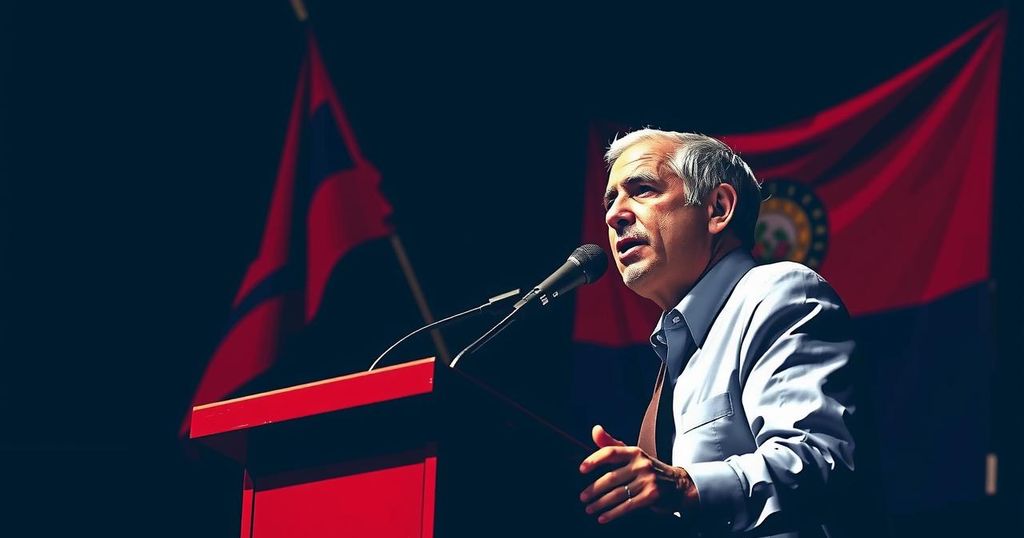Politics
2024 ELECTIONS, ALVARO DELGADO, BROAD FRONT, CANAL 10, CANAL 12, CIFRA, ELECTION, ELECTIONS, EQUIPOS CONSULTORES, FRENTE AMPLIO, JOSE, LUIS LACALLE POU, NATIONAL PARTY, OR, PEPE " MUJICA, PRESIDENTIAL CANDIDATES, REPUBLICAN, REPUBLICAN COALITION, SOUTH AMERICA, TRADE RELATIONS, URUGUAY, VOTER TURNOUT
Jamal Walker
0 Comments
Yamandu Orsi Set to Lead in Uruguay’s Presidential Election
Yamandu Orsi, from the leftist Frente Amplio alliance, is expected to win Uruguay’s presidential election, challenging the incumbent center-right government led by Alvaro Delgado of the National Party. Orsi’s campaign, supported by former president Jose ‘Pepe’ Mujica, reflects voter discontent over rising crime and insecurity during the conservative rule. As voters express a desire for safety and progressive governance, this election marks a significant potential shift in Uruguay’s political direction.
Yamandu Orsi, the candidate from the leftist Frente Amplio alliance, appears poised to secure victory in Uruguay’s presidential election, signaling a potential leftward shift in governance after five years characterized by center-right leadership. Preliminary results indicate Orsi could garner as much as 49.5 percent of the vote against Alvaro Delgado of the National Party, suggesting a significant discontent among voters towards the outgoing government led by President Luis Lacalle Pou of the Republican Coalition.
The electoral landscape was intensely competitive during the runoff, following a first-round vote where Orsi received 43.9 percent. His campaign has been notably bolstered by support from former president Jose “Pepe” Mujica, well-regarded for his previous five years in office and his commitment to progressive ideals. Adept at mobilizing support, Orsi’s candidacy has galvanized voters seeking a departure from the conservative trajectory of recent years.
With the electorate expressing lingering concerns regarding public safety and crime, as exemplified by citizens citing insecurity as their foremost issue, the outcome of this election is momentous. Voter sentiment indicates a collective yearning for a government that prioritizes safety and welfare in these tumultuous times. Compulsory voting in Uruguay underscores the public’s engagement in this democratic process, as citizens exercise their cherished right to choose their leaders.
The recent presidential election in Uruguay is pivotal as it concludes five years of center-right governance. The Frente Amplio alliance, which previously held power for three consecutive terms from 2005 to 2020, was dethroned largely due to rising insecurity, high taxation, and increased illicit drug trafficking. The return of leftist leadership is seen as a potential corrective to these challenges, with candidates addressing public concerns through their platforms. Historical context reveals Uruguay’s reputation as a stable democracy that has endorsed progressive legislation, including the legalization of abortion and cannabis, asserting its commitment to human rights and social equity. Uruguay, with its dense population of 3.4 million, has recently struggled with crime, a significant voter concern. As such, electorates are favoring candidates who promise to prioritize public safety and economic welfare. Furthermore, the keen interest of voters in the electoral process highlights their desire to influence future governmental policies actively.
The projected victory of Yamandu Orsi in Uruguay’s presidential election signifies a potential return to leftist leadership, marking a critical juncture in the nation’s political landscape. This election reflects the electorate’s desire for change following five years of conservative rule, driven by concerns over public safety and economic stability. Orsi’s affiliation with the influential figure of Jose “Pepe” Mujica has reinforced his campaign, positioning him as a candidate capable of addressing the challenges faced by contemporary Uruguay. With compulsory voting ensuring high civic engagement, the outcome of this election is anticipated to be a transformative moment for the country.
Original Source: www.france24.com




Post Comment